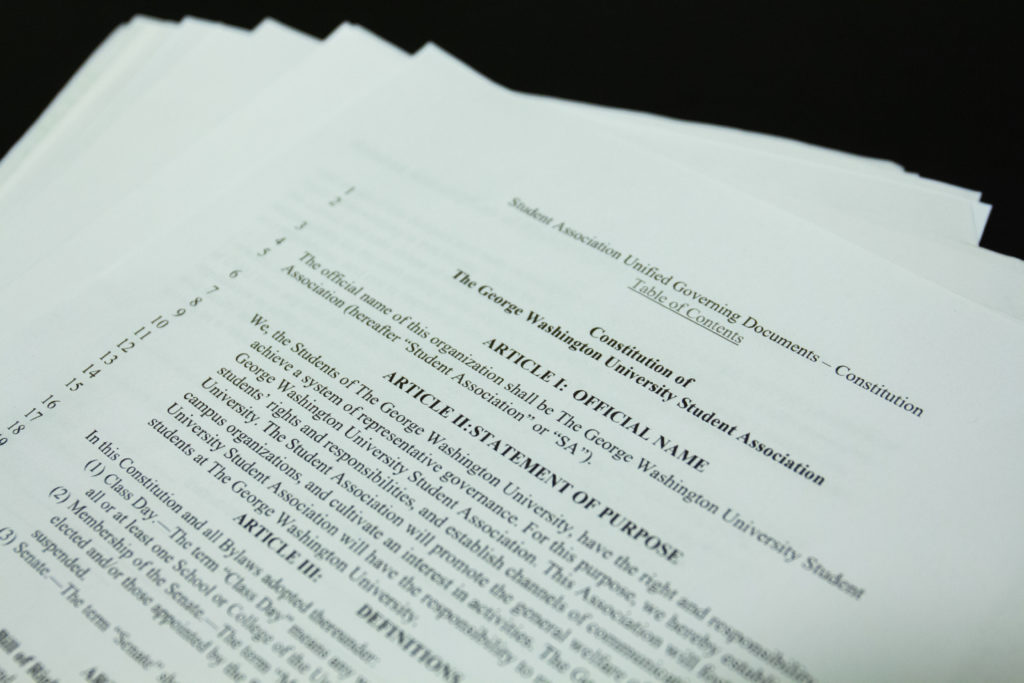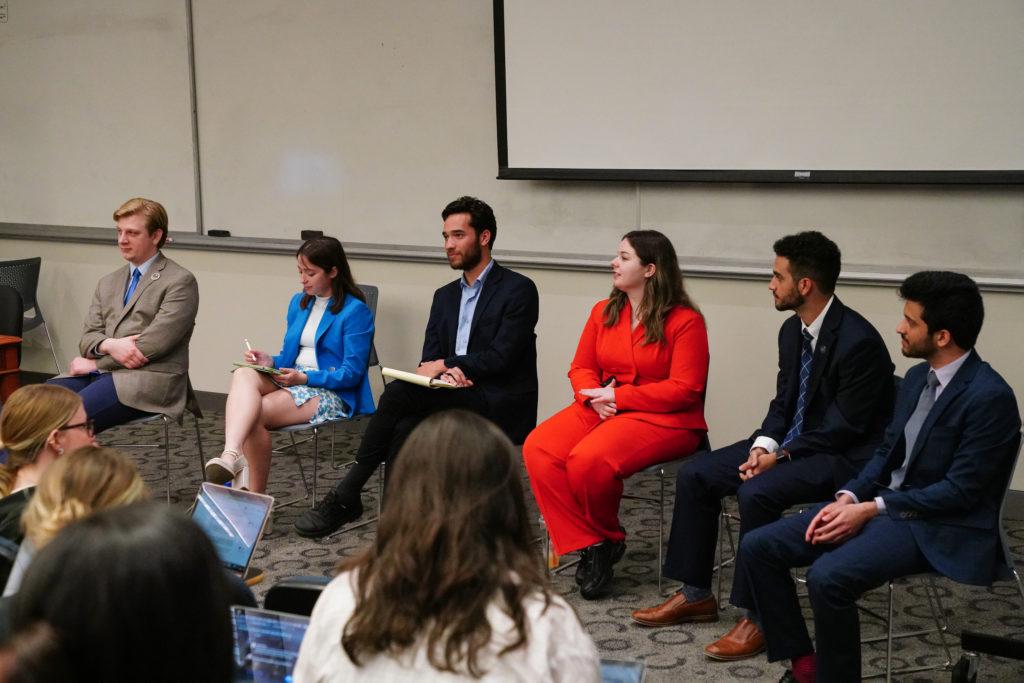Students will vote on a referendum on this year’s SA election ballot that, if approved, would codify language in the Student Association constitution.
SA Senate Chairperson Pro Tempore Demetrius Apostolis, the chair of the Governing Documents Review Committee that advanced the proposed constitutional amendments, said the referendum will adjust how the SA’s executive cabinet can temporarily remove the president and how organizations overseeing the SA maintain independence. The referendum will also change policies on how the president can appoint staff to the executive branch.
If students approve the referendum, the SA will amend its constitution after the Joint Elections Commission verifies the election results, according to SA bylaws.
The SA constitution mandates the senate formally review the constitution every three years. Senators formed the Governing Documents Review Committee in July after executive cabinet members realized Article 15 of the constitution, which outlined the process to remove a president from office, was filled with vague language as they were attempting to oust SA President Christian Zidouemba from office.
Apostolis said the committee took between four and six months to discuss potential changes.
In 2020, the SA amended its constitution via referendum to clarify the separation of powers between the legislative, executive and judicial branches. About 58 percent of voters supported approving the amendment.
Apostolis said clarifying the SA’s governing documents like the constitution can help students understand how the SA should actually function which allows them to easily provide input on SA policies.
“They can be well-informed,” he said. “Everything in the constitution before was super confusing.”
Article 15
If passed, the referendum will change Article 15 to specify the executive cabinet can only remove the president for up to one week through a unanimous vote from the executive cabinet.
The president can resume office after a removal vote if they submit a letter saying they are still able to perform their duties to the senate chairperson pro tempore and the chief justice of the Student Court. If the executive cabinet submits a letter challenging the president’s abilities within four calendar days, the senate will then decide whether to keep or remove the president in a vote within 48 hours of receiving the letter.
The executive cabinet can remove the president from office up to three times during a single term, according to the constitution. Senators can impeach any sitting member and students can recall the president, vice president and senators if 10 percent of constituents vote, the constitution states. If two-thirds of senators vote that the president is unable to perform the duties of the office, then the president will be removed and the vice president will fill in as acting president.
The referendum amends Article 15 to remove the chief of staff from the executive cabinet, which would preclude the position from any presidential removal vote. The chief of staff would remain a member of the executive branch.
Zidouemba argued in court proceedings last semester that under Article 15, his July removal was temporary, meaning he maintained legitimacy as president. He argued under Article 15, the executive cabinet can only temporarily remove the president, not permanently. The court unanimously ruled in October that Zidouemba’s presidency is legitimate because Article 15 only allows the executive cabinet to temporarily remove the president.
“This summer, what happened was there was no real outline about what it would take for the president to get their power back,” Apostolis said. “That’s where we ran into that constitutional crisis.”
Article 13
An amendment to Article 13 would clarify that the senate must establish an independent regulatory agency under the executive branch to administer all SA elections and ensure the body enforces election laws. The JEC currently oversees SA elections in an independent capacity, but the constitution lists the JEC immediately after the executive, legislative and judicial branches.
Apostolis said the amendment would reclassify the JEC as an independent regulatory agency that autonomously oversees SA elections.
He said the amendment would also allow other independent regulatory agencies to form, which could provide oversight and advice to the SA.
“At present, in the Constitution, the JEC exists almost as a fourth branch of government,” Senate Legal Counsel Juan Carlos Mora said at a March senate meeting.
Article 8
A revised eighth article of the constitution would require all senate legislation to comply with the University Guide on Student Rights and Responsibilities, the Student Code of Conduct and the SA Charter. Article 8 states legislation cannot violate the SA constitution but does not explicitly state that the SA must comply with the Code of Conduct or the University Guide on Student Rights and Responsibilities.
Apostolis said the changes to Article 8 codify rules that were already implicit in the constitution, and the changes do not institute any new standards that the SA did not follow previously.
SA President Christian Zidouemba said he was concerned about the change to Article 8 because forcing the SA to obey University policies threatens its autonomy.
“We exist under the umbrella of the University,” he said. “Yet, as a union of students, we must possess the autonomy to be critics of the University.”
Article 10
If the referendum passes, it would also change Article 10, adding two subsections outlining the senate’s ability to collect a University-authorized SA fee. Students currently pay a $3 per-credit fee that goes to the SA’s budget, which in turn funds student organizations through the senate. The amendment clarifies the senate has the power to accept funds like donations and provide funding for the general welfare of students, like money for student organizations and events.
Article 11
The president must notify the senate with a letter when appointing staff outside the executive cabinet per the amended Article 11 if students pass the referendum. The constitution currently states the president may appoint secretaries and other members at their own discretion.
Article 20
The referendum would add language to Article 20 of the constitution to clarify that the Board of Trustees must approve a student vote to liquidate or dissolve the SA. In 2019, write-in SA presidential candidate Justin Diamond ran on the platform of abolishing the SA.
Article 16
Amendments to Article 16 would allow two-thirds of the senate to table a vote the student body petitions. The senate must currently vote on a petition if 100 students sign it.
“We really wanted to make sure that we were just clarifying and making it simpler so that it’s easier to understand for everyone in the future,” Apostolis said.











